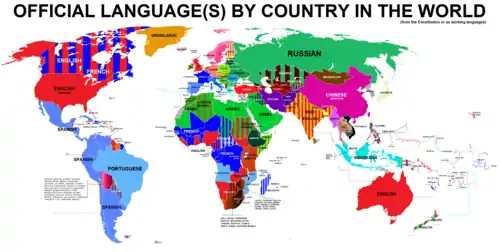زبان رسمی
زبان رسمی به زبانی گفته میشود که بهطور قانونی در کشور یا منطقهای از کشور که از توانایی وضع قوانین خاص آن منطقه برخوردار است، انتخاب شدهاست.

معمولاً زبانی بهعنوان زبان رسمی انتخاب میشود که اکثریت جمعیت به آن سخن گویند (زبان ملی). اما بهدلیل وجود جامعههای چندزبانه یا بهدلیل حفظ وحدت ملیِ یک کشور ممکن است این دو بر هم منطبق نباشند یا «زبان ملی» یکی از «زبانهای رسمی» باشد.
همچنین، برخی سازمانهای جهانی، جهت ساماندهی ارتباطات و جلسات، برای امور خود زبان رسمی تعریف میکنند. برای نمونه، سازمان ملل متحد، شش زبان (انگلیسی، فرانسوی، اسپانیایی، روسی، چینی و عربی) بهعنوان زبان رسمی تعریف کردهاست.
کشور هایی همچون سوئیس،کانادا،بلژیک،بولیوی،بوسنی،سنگاپور،عراق و... دارای چند زبان رسمی هستند
فهرست کشورها بر اساس تعداد زبانهای به رسمیت شناختهشده
این فهرست فقط شامل کشورهایی با سه زبان رسمی و بیشتر هستند و شامل کشورهای دو زبانه نیست:[1]
| کشور | ملی | اقلیت | منبع |
|---|---|---|---|
| ۳۷ | ۳۷ | [2] | |
| ۱۸ | ۱۸ | [3] | |
| ۱۶ | ۱۶ | [4] | |
| ۱۱ | ۱۱ | [5] | |
| ۸ | ۸ | ||
| ۴ | ۴ | [6] | |
| ۴ | ۴ | [7] | |
| ۳ | ۳ | [8] | |
| ۳ | ۳ | [9] | |
| ۳ | ۳ | [10] | |
| ۳ | ۳ | [11] | |
| ۳ | ۱۵ | [12] | |
| ۳ | ۳ | [13] | |
| ۳ | ۳ | [14] | |
| ۳ | ۳ | [15] | |
| ۳ | ۳ | [16] | |
| ۳ | ۳ | [17] | |
| ۳ | ۳ | [18] | |
| ۳ | ۳ | [19] | |
| ۳ | ۳ | [20] |
کشورها
آمریکا
از لحاظ قانونی در قانون فدرال هیچ زبان رسمی وجود ندارد، ولی در بیش از ۲۷ ایالت آمریکا زبان انگلیسی برای دادگاهها و ادارههای رسمی لازم میباشد.[21]
جستارهای وابسته
منابع
- https://en.wikipedia.org/wiki/List_of_countries_by_the_number_of_recognized_official_languages
- Bowman, Kirk; Arocena, Felipe (2014). Lessons from Latin America: Innovations in Politics, Culture, and Development. Toronto, New York, Plymouth: University of Toronto Press. p. 79. ISBN 9781442605510.
- Zeldin, Wendy (2017-06-21). "Taiwan: New Indigenous Languages Act | Global Legal Monitor". www.loc.gov. Retrieved 2019-02-23.
- Chisita, Collence Takaingenhamo; Rusero, Alexander R.; Shoko, Munyaradzi (2016). "Leveraging Memory Institutions to Preserve Indigenous Knowledge in the Knowledge Age: Case of Zimbabwe". In Callison, Camille; Roy, Loriene; LeCheminant, Gretchen Alice. Indigenous Notions of Ownership and Libraries, Archives and Museums. Berlin, Boston: Walter de Gruyter GmbH & Co KG. p. 273. ISBN 9783110395860.
- Sheppard, Charles; Joubert, Jané; Saayman, Gina (1998). "Education and Language Profile". In Kok, Pieter. South Africa's Magnifying Glass: A Profile of Gauteng Province. Pretoria: HSRC Press. p. 101. ISBN 9780796918796.
- Werlen, Iwar (2007). "Receptive Multilingualism in Switzerland and the Case of Biel/Bienne". In ten Thije, Jan D.; Zeevaert, Ludger. Receptive Multilingualism: Linguistic Analyses, Language Policies, and Didactic Concepts. Amsterdam, Philadelphia: John Benjamins Publishing. p. 138. ISBN 9789027219268.
- Costa, Peter I. De (2016). The Power of Identity and Ideology in Language Learning: Designer Immigrants Learning English in Singapore. Cham, Switzerland: Springer. p. 55. ISBN 9783319302119.
- Duca, Patrick L. Del (2010). Choosing the Language of Transnational Deals: Practicalities, Policy, and Law Reform. Chicago, IL: American Bar Association. p. 157. ISBN 9781604429374.
- Leung, Janny H. C. (2019). Shallow Equality and Symbolic Jurisprudence in Multilingual Legal Orders. Oxford Studies in Language and Law. Oxford and New York: Oxford University Press. p. 64. ISBN 9780190210342.
- Uwimana, Diane (17 September 2014). "English is now official language of Burundi". IWACU English News. Retrieved 2019-02-23.
- Macmillan, Palgrave (2017). The Statesman's Yearbook 2017: The Politics, Cultures and Economies of the World. London: Springer. p. 352. ISBN 9781349683987.
- Borsdorf, Axel; Stadel, Christoph (2015). The Andes: A Geographical Portrait. Cham, Switzerland: Springer. p. 142. ISBN 9783319035307.
- Leung, Janny H. C. (2019). Shallow Equality and Symbolic Jurisprudence in Multilingual Legal Orders. Oxford Studies in Language and Law. Oxford and New York: Oxford University Press. p. 59. ISBN 9780190210342.
- Zipp, Lena (2014). Educated Fiji English: Lexico-grammar and variety status. Amsterdam, Philadelphia: John Benjamins Publishing Company. p. 13. ISBN 9789027270771.
- Gilles, Peter; Seela, Sebastian; Sieburg, Heinz; Wagner, Melanie (2011). "Languages and Identities". In IPSE-Identités Politiques Sociétés Espaces. Doing Identity in Luxembourg: Subjective Appropriations - Institutional Attributions - Socio-Cultural Milieus. Piscataway, NJ: Transcript Verlag. p. 91. ISBN 9783839416679.
- Leung, Janny H. C. (2019). Shallow Equality and Symbolic Jurisprudence in Multilingual Legal Orders. Oxford Studies in Language and Law. Oxford, New York: Oxford University Press. pp. 66–67. ISBN 9780190210342.
- Wanek, Alexander (1996). The State and Its Enemies in Papua New Guinea. Padstow, UK: Routledge. p. 92. ISBN 9781136779091.
- Ammon, Ulrich; Dittmar, Norbert; Mattheier, Klaus J.; Trudgill, Peter (2006). Sociolinguistics: An International Handbook of the Science of Language and Society. 3 (2nd ed.). Berlin, New York: Walter de Gruyter. p. 1973. ISBN 9783110184181.
- Michaelis, Susanne; Rosalie, Marcel (2009). "Loanwords in Seychelles Creole". In Haspelmath, Marin; Tadmor, Uri. Loanwords in the World's Languages: A Comparative Handbook. Berlin: Walter de Gruyter. p. 216. ISBN 9783110218435.
- Mohns, William J. (2011). "The Digital Archive and Catalogues of the Vanuatu Cultural Center: Overview, Collaboration and Future Directions". In Taylor, John; Thieberger, Nick. Working Together in Vanuatu: Research Histories, Collaborations, Projects and Reflections. Canberra: ANU E Press. p. 142. ISBN 9781921862359.
- James M. Inhofe; Cecilia Muñoz. "Should English be declared America's national language?". The New York Times upfront. Scholastic. Retrieved August 25, 2013.
- Dictionary of Language Teaching and Applied Linguistics, Jack C. Richards et. al., Longman
